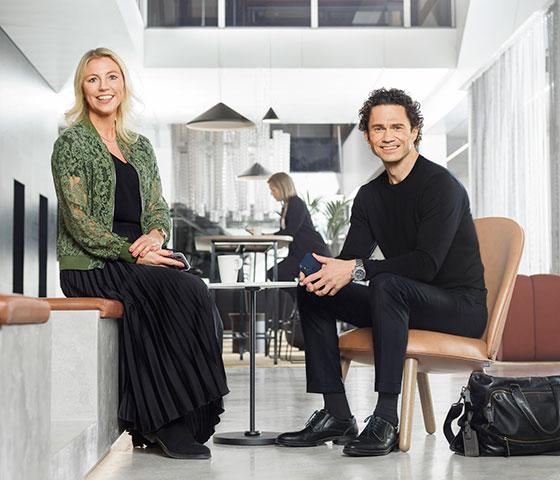
Guided by the SDGs
AFRY Insights magazine met with Marie Trogstam, AFRY’s Head of Sustainability, to discuss the evolution of the AFRY brand and what steps AFRY is taking to live up to its brave commitment: Making Future.
Marie joined AFRY in Autumn last year, coming from her role as Manager for International Sustainable Business at Business Sweden, where she was responsible for supporting Swedish companies in developing their business in a sustainable manner, also through cooperation with organisations such as the United Nations, SIDA and Save the Children.

AFRY Insights: Marie, please, tell us a bit about what attracts you to AFRY as a company?
Marie Trogstam: I joined the company just two months before we launched our new brand and ÅF and Pöyry became AFRY. What has impressed me from the start is the deep and broad industry expertise that we have in many of the sustainability focus areas that businesses can make a difference in. Being the Head of Sustainability within a company that truly wants to make a difference is a great opportunity. The AFRY brand stands for brave leadership and building a better world for future generations, and sustainability plays a central role in that ambition. This approach is very much in line with what I believe we at AFRY can achieve.
How have you seen the company evolve over the last year in respect to the sustainability topic?
I bring my perspective of a holistic view on sustainability and it is impressive to see that all three dimensions of economic, social and environmental sustainability are significantly present within AFRY.
Now we need to focus on the climate and the environment at large, including biodiversity, and this should be happening without losing sight of the economic and social side of sustainability. For example, when we work on road safety, we keep in mind the child’s perspective or when we plan for future cities, we consider factors like gender.
The way we humans live, work and interact is complex, as is the approach to making these processes more sustainable. Why do you believe in a holistic approach?
In 2015, the 17 Sustainable Development Goals (SDGs) and the 2030 agenda were adopted by all United Nations Member States. This universal call to action, to achieve a better and more sustainable future for everyone, promotes prosperity while protecting the planet. At the time when the 2030 agenda was launched, the idea was to better understand what needs to be done in many different areas. Now, in 2020, we are in the decade of action.
One of AFRY’s non-financial targets is to develop engineering and design solutions that contribute towards the SDGs. It could be argued that it would be better for a company to focus on just a few of the SDGs, but they are all interconnected. If we speak for example about “Ensure access to affordable, reliable, sustainable and modern energy for all”, which is absolutely key for a global transformation, we need indeed to look at the whole value chain; We need to know about the generation of power and basic infrastructure. How will energy be stored? There are many related aspects that need to be analysed and taken into account to create, develop and implement solutions that build a sustainable society, environmentally as well as socioeconomically.
What is really new and affects the business model of modern companies is the value creation perspective, as well as looking both upstream and downstream – through the whole value chain. In order to reach truly sustainable development, we need to think holistically and address the complexities.
Why is it crucial to find new approaches for measuring sustainability?
Based on the importance of both minimising the negative impact (the footprint) and maximising the positive impact (the handprint), we at AFRY are already reporting according to some of the existing frameworks, for example the Carbon Disclosure project (CDP), and we follow the development of the EU Taxonomy closely.
When it comes to the climate and environment, we are already measuring our own impact, such as our internal CO2 emissions, but we also see the importance of creating value with our sustainable solutions towards our clients and finding proper ways of measuring the positive impact gained through our collaboration with clients. Only with this comprehensive view of footprint vs. handprint can we understand how to leverage the full potential of our position.
As you say there is a lot of interconnectivity. How do you get collaboration around this complexity?
On a strategic level, working in an aligned way with our top clients and stakeholders as well as our employees is essential to succeed. Walking the talk and engaging others who can make a difference plays an important role.
Training will be key internally, to empower our 17,000 experts to make the biggest difference they can, from climate awareness to understanding the latest technologies and opportunities within our areas of expertise. We are beginning to see requests from clients that require a sustainability focused approach and we must prove that our consultants possess the leading-edge knowledge to fully enable our clients to reach their goals.
How can cooperation or partnership between different organizations help AFRY and other companies to go further in sustainability?
As one concrete example, during the climate change conference COP 25, that our Group Executive Management team attended last December, I was moderating a seminar where we had the Swedish Minister for Development Corporation, a representative from WWF and some major clients and partners, such as Ericsson, Scania, ABB and Ragnsells, all talking together about how we could scale up Nordic experiences and knowledge to be useful in a global context when it comes specifically to the energy transition. For me, having that type of join up is really important to make progress.
Providing insights, sharing experiences and maintaining a dialogue with different types of partners is key and would allow us to get going fast enough to have the exponential development that we really need to reach both the 2030 agenda and the Paris climate agreement.
This year, AFRY announced a collaboration with Gapminder and signed up to the 1.5ºC Business Playbook. How do you see these partnerships supporting AFRY’s progress towards more efficient sustainability work?
The 1.5ºC Business Playbook is a concrete tool that guides companies and organisations to exponential climate strategy and action, helping them align with the 1.5°C ambition to halve emissions by 2030 and reach close to net zero by 2050. The 1.5°C Business Playbook helps companies shift business focus to zero-carbon solutions and is designed to work in harmony with existing standards and key initiatives such as the greenhouse Gas Protocol (GHG), Science Based Targets initiative (SBTi), and CDP.
Our collaboration with the Gapminder Foundation allows us to address the complex nature of the world, so that we can actually make progress in our understanding of the transformation from a linear to a circular society, which requires us to be brave and stay close to the facts that drive our decision making. If we can contribute to providing facts and dismantling global misconceptions around our areas of expertise, we also contribute to creating a framework that allows other decision-makers to be able to make accurate decisions. Information is key as well as proving the impact of different types of solutions, illustrated with figures and concrete cases.
You attended the 2020 High-Level Political Forum (HLPF) on sustainable development in July. Are there any insights you would like to share?
The UN plays a key role in driving global transformation and fulfilment of the 2030 Agenda. On this occasion, the HLPF focus was on accelerated action and transformative pathways and realising a decade of action and delivery for sustainable development.
Sweden was represented by an e-delegation, chaired by the Swedish Secretary of State Eva Svedling. Representing AFRY, I had the great honour of presenting the Swedish official statement on the importance of the relaunch being both socioeconomically and environmentally sustainable, during and after the current COVID-19 crisis. Sweden fully supports a green and inclusive recovery and is committed and ready for delivery on the SDGs.
I think that Sweden and other Nordic countries offer a combination of large companies and small scale-up companies with skilled workers, together with an active civil society and then also the government initiatives needed to support progress. For example, on 10th of July this year, the Swedish government adopted circular economy as a national strategy and “Fossil Free Sweden” is a government initiative with over 20 roadmaps within different segments in industry, that bring together all the different stakeholders in a specific sector, for example within buildings or mining.
What is your advice to leaders across different companies, countries and industries to get involved in the implementation of sustainability goals?
Based on the development I have seen over the years, being transparent and making a point of talking about the challenges are two very important factors. I encourage companies to be brave enough to recognise the complexities, support each other and share best practices. I believe it is a win-win way forward if we cooperate, between public and private actors as well as within a multilateral context.




